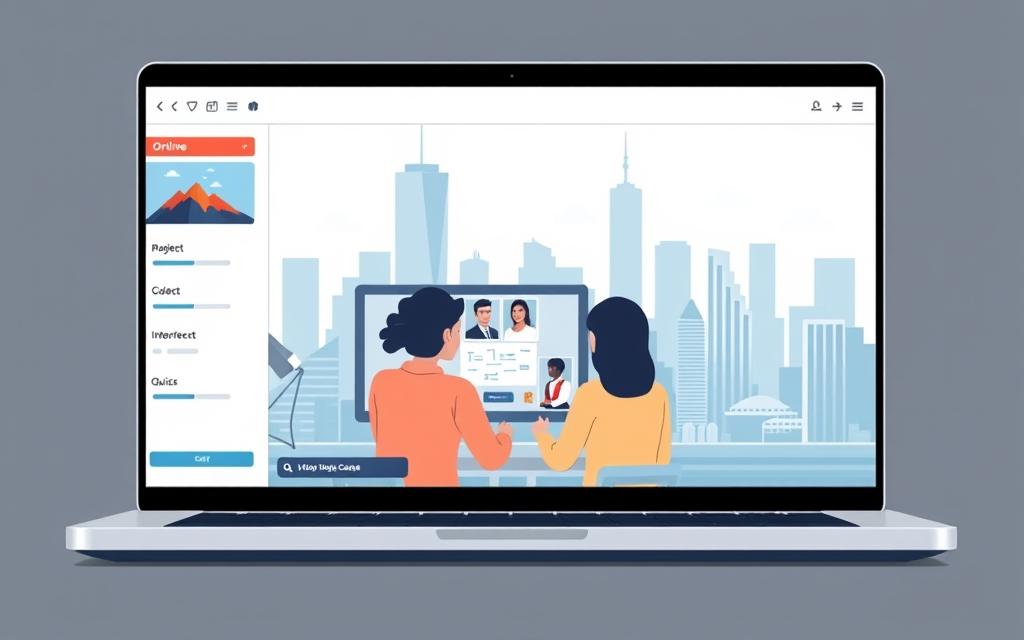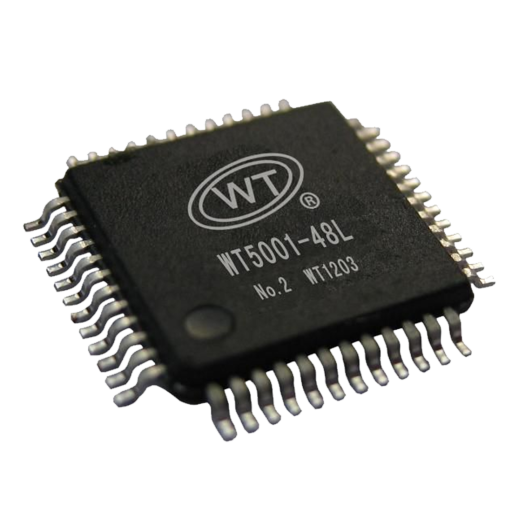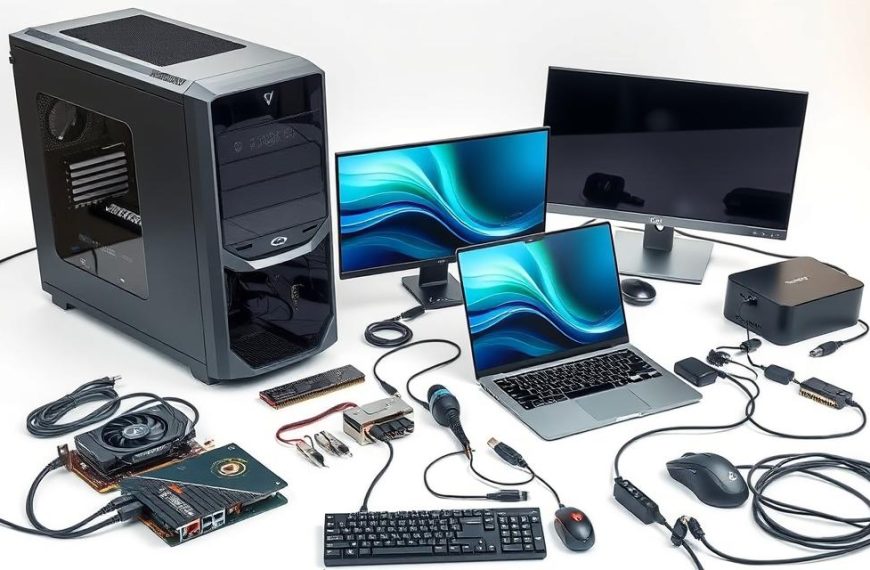In today’s digital age, understanding computer systems is essential for both professional growth and personal development. With the increasing demand for tech-savvy individuals, mastering these skills has never been more important. Whether you’re aiming to advance your career or simply enhance your knowledge, there are effective ways to achieve this goal.
Structured online courses, authoritative textbooks, and hands-on experience are three primary methods to build expertise. Online platforms offer flexibility, allowing learners to study at their own pace. Textbooks provide in-depth theoretical knowledge, while practical application ensures real-world readiness.
Modern learning paths often combine these methods, with 74% of tech professionals adopting hybrid approaches. This blend of theory and practice ensures a well-rounded understanding of both hardware components and software ecosystems. By leveraging these resources, you can develop the skills needed to thrive in today’s tech-driven world.
Introduction to Learning Computer Systems
Building a strong foundation in computer systems is crucial for navigating modern technology. The COVID-19 pandemic disrupted traditional learning methods, accelerating the shift to digital education. Today, recovery efforts focus on bridging gaps in computing literacy and ensuring equitable access to resources.
Understanding computer systems involves mastering four key components: hardware, software, networking, and security. These elements form the backbone of digital operations, enabling individuals to troubleshoot issues and optimize performance. However, studies reveal that 63% of U.S. adults lack advanced problem-solving skills in this area.
Progressive learning is essential for building expertise. Start with basic operations, such as file management and internet navigation. Gradually advance to programming fundamentals and system administration. This step-by-step approach ensures a comprehensive understanding of both theory and practice.
Organizations like the National Digital Equity Center play a vital role in promoting digital inclusion. They provide Maine residents with free equipment and daily training sessions, empowering people to enhance their knowledge and skills. Such initiatives are critical for fostering a tech-savvy society.
How to Learn Computer System Through Online Courses
Online courses have become a popular way to gain expertise in technical fields. They offer flexibility, allowing learners to study at their own pace. With a variety of platforms available, choosing the right one is essential for success.

Selecting the Ideal Platform
Different platforms cater to specific needs. For example, Learning Express Plus focuses on progress tracking, while CodeAcademy emphasizes coding skills. GCFLearnFree.org provides over 200 topics with 2,000 lessons and 1,000 videos, making it a comprehensive resource.
TechBoomers.com specializes in courses for older adults, including modules on privacy. CodeAcademy offers a career-matching quiz and pro-tier programming courses. Typing.com features a gamified touch-typing curriculum, making learning engaging and interactive.
Advantages of Digital Learning
Online learning offers unparalleled flexibility. Learners can access materials anytime, anywhere. This accessibility makes it easier for people to balance education with other commitments.
Many platforms provide free tiers, with premium options for advanced features. This cost-effective approach ensures that education is accessible to a wider audience. Combining these resources helps build a strong foundation in technical skills.
| Platform | Key Features | Cost |
|---|---|---|
| Learning Express Plus | Progress tracking, diverse topics | Free and premium options |
| GCFLearnFree.org | 200+ topics, 2,000 lessons | Free |
| CodeAcademy | Coding focus, career quiz | Free and pro-tier subscriptions |
| TechBoomers.com | Specialized for older adults | Free |
| Typing.com | Gamified touch-typing | Free and premium options |
Utilizing Textbooks to Enhance Your Knowledge
Textbooks remain a timeless resource for mastering technical concepts. They provide structured content, making it easier to grasp complex ideas. Whether you’re a beginner or an advanced learner, the right book can significantly boost your understanding.
Recommended Textbooks for Beginners
Starting with the basics is essential. Beginner-friendly textbooks often cover hardware components and operating system fundamentals. These resources simplify complex topics, making them accessible to newcomers.
- Computer Basics for Absolute Beginners: Focuses on hardware and software essentials.
- Introduction to Operating Systems: Explains core concepts in an easy-to-understand manner.
- Teach Computing Curriculum: Offers a structured approach to hardware and software basics.
Advanced Textbooks for In-Depth Understanding
For those seeking deeper knowledge, advanced textbooks delve into system architecture and network security principles. These materials are ideal for professionals or enthusiasts looking to expand their expertise.
- Computer Organization and Design: Covers advanced hardware and system architecture.
- Network Security Essentials: Focuses on protecting systems from cyber threats.
- Operating System Concepts: Provides a comprehensive look at modern operating systems.
When selecting a textbook, consider factors like publication recency, hands-on exercises, and peer reviews. Supplemental materials, such as companion websites and instructor resources, can further enhance your learning experience.
Gaining Hands-On Experience with Computer Systems
Practical experience is the cornerstone of mastering technical skills in today’s tech-driven world. While theoretical knowledge is essential, applying it through real-world projects ensures a deeper understanding. Hands-on practice bridges the gap between abstract concepts and tangible expertise.

Practical Projects and Exercises
Engaging in practical projects accelerates learning and builds confidence. Start with hardware assembly using old components. This exercise familiarizes you with the physical aspects of computers and their functionality.
Software simulation tools provide a safe environment for experimenting with operating systems and configurations. These tools allow you to test ideas without risking damage to actual hardware. Remote lab environments are another excellent resource for practicing network setups and troubleshooting.
Career-building projects, such as building a PC or creating basic applications, enhance both technical and problem-solving skills. These activities prepare you for professional challenges and demonstrate your capabilities to potential employers.
Local Resources and Workshops
Local resources offer valuable opportunities for hands-on learning. The National Digital Equity Center provides daily workshops covering topics like hardware basics and software troubleshooting. These sessions are ideal for beginners and advanced learners alike.
Teach Computing offers live remote training sessions, allowing participants to interact with instructors in real-time. Maker spaces and tech meetups are also excellent venues for collaboration and skill development. Use the checklist below to evaluate local resources:
| Resource | Key Features | Availability |
|---|---|---|
| National Digital Equity Center | Daily workshops, free equipment | Nationwide |
| Teach Computing | Live remote training, interactive sessions | Online |
| Local Maker Spaces | Collaborative projects, shared tools | Varies by location |
| Tech Meetups | Networking, skill-sharing | Local communities |
Combining practical projects with local resources ensures a well-rounded learning experience. Whether you’re assembling hardware or attending workshops, hands-on practice is key to mastering computer systems.
Conclusion
Mastering technical expertise requires a balanced mix of structured learning and practical application. A triad approach—40% structured courses, 30% textbook study, and 30% hands-on practice—ensures comprehensive knowledge and skill development. This method prepares you for real-world challenges while building a strong theoretical foundation.
Continuous learning is vital in fast-evolving tech fields. Emerging trends like AR-assisted education are reshaping how we interact with computer systems. Staying updated with these advancements ensures long-term relevance and expertise.
Create a personalized 6-month roadmap by combining online courses, authoritative textbooks, and practical projects. Leverage local resources and workshops to enhance your hands-on experience. By integrating these tools, you’ll achieve mastery and confidence in navigating modern computer systems.
FAQ
What are the best ways to start learning about computer systems?
Begin with online courses, textbooks, and hands-on practice. Platforms like Coursera, Udemy, and edX offer beginner-friendly programs. Books like “Computer Systems: A Programmer’s Perspective” are excellent for foundational knowledge.
How do I choose the right online course for computer systems?
Look for courses with positive reviews, structured curricula, and practical exercises. Platforms like LinkedIn Learning and Khan Academy provide tailored options for different skill levels.
What are the benefits of learning through online platforms?
Online learning offers flexibility, self-paced study, and access to global expertise. You can also interact with communities and forums for additional support.
Which textbooks are recommended for beginners?
Start with “Operating System Concepts” by Abraham Silberschatz or “Computer Organization and Design” by David A. Patterson. These books simplify complex topics for newcomers.
Are there advanced textbooks for deeper understanding?
Yes, books like “Modern Operating Systems” by Andrew S. Tanenbaum and “Computer Architecture: A Quantitative Approach” by John L. Hennessy are ideal for advanced learners.
How can I gain hands-on experience with computer systems?
Work on practical projects like building a simple OS or troubleshooting hardware. Attend local workshops or join communities like Meetup for collaborative learning.
Where can I find local resources or workshops?
Check community centers, libraries, or tech hubs in your area. Websites like Eventbrite often list workshops and seminars focused on computer systems.
What are some practical projects to enhance my skills?
Try creating a virtual machine, setting up a network, or developing a basic operating system. These projects build both theoretical and practical expertise.










